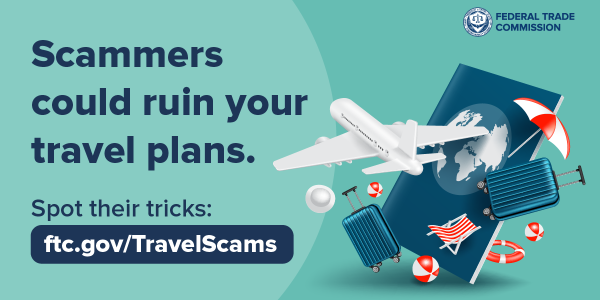Travel Scams

If you’re planning to travel, watch out for scammers using emails or websites to trick you into stealing your money or information, such as:
- “Free” vacations, even though you have to pay fees or taxes first
- Deals via robocalls, which are illegal unless you granted the company permission to call you this way
- Vacation home scams, in which a scammer tricks you into renting a home they don’t actually own; when you arrive, you found out that it was already booked.
Protecting Yourself
- Research any travel website by checking reviews; other people may warn about the site being a scam.
- Ask for details on any travel offer. If the scammer fails to give you specifics, such as the hotel address, refuse the offer.
- Check for the payment methods. If a travel site asks you to pay just with a wire, gift card, or cryptocurrency, it’s most likely a scam. Scammers use these methods because it is very difficult to get the money back.
- Beware if the scammer asks for a quick decision on a travel deal. They want you to rush into a decision without researching it first. If they pressure you, refuse the offer.
If You Become a Victim
Take the following actions right away:
- Notify your bank or credit union for any travel expenses you did not expect.
- File a police report.
- File a complaint with the FTC at https://reportfraud.ftc.gov/.
Watch this video from NBC4 Washington for more details on travel scams:
